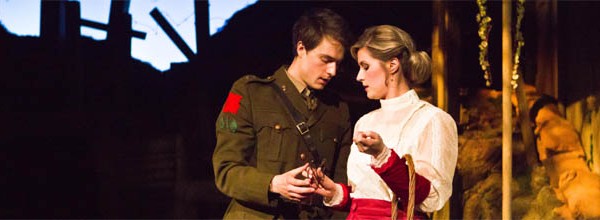It might be difficult to see exactly what could be said that is new or even different. But it is true that even now, nearly a hundred years later, our minds struggle to understand or even get a purchase on the genuinely senseless slaughter of some many young men. In Journey’s End, for instance, the action on the stage was confined to a single, cramped trench. Birdsong attempts to soar much further and higher.
However, in RC Sherrif’s play, written within ten years shadow of the war itself, men are still committed to the cause, a great deal of energy being burned up in keeping their civilian lives separate from the lives they live as soldiers. There are different challenges in Birdsong, however: while many of the lines of dialogue are familiar, such as often repeated promises to meet up again when the war is over, there’s a grimy lack of hope here: officers eyes are dead, clinically and coldly aware that they are sending thousands of boys to a futile death.
Not only is everyone seemingly unable to stop events that they all know to be entirely pointless and stupid, but moreover, it seems that nobody’s mind is really on the task at hand. We are witnessing the war at some distance from the ‘golden summer’ when hopeful boys signed up with the expectation that they’d be back by Christmas: now, nobody is quite that naïve. ‘I wonder if we will ever meet again’ one character remarks, more to make polite, hopeful conversation than anything else. ‘I expect not,’ comes the unblinkered, somewhat broken reply.
In an interview, adaptor Rachel Wagstaff suggests that it was youthful naivety rather than confidence that enabled her to contact novelist Sebastian Faulks in the first place with a mind to adapting his epic novel (she first had the idea while reading Birdsong on the bus to and from school). Impressively, it’s this naiveté that powers her adaptation, and is in no way a negative beast: rather than attempting the traditional, and supposedly sensible route of translating a novel into a theatrical device, Wagstaff opts for a resolutely more cinematic approach: scenes rattle along at a brisk pace, snapping and cracking against each other with all the pace of cross-cutting in a movie: early on, many scenes last barely more than four minutes.
This heightens the idea that we are witnessing memories from the past, rather than a continuous narrative. While this doesn’t mean that purists of the novel will be necessarily appeased – significant characters from the novel are compressed, or in one major case, deleted entirely, and at times, you’re aware that plot points that might originally have taken thirty pages or so are dealt with in dialogue that lasts less than a line – it does allow scenes – and characters’ memories of those scenes – to break over each other on the stage like shards of light in the darkness. It’s a remarkably efficient way of condensing such a huge book with the minimum of casualties.
Oddly enough, this has other benefits: for instance, this reviewer is not normally fond of ‘doubling-up’ in casting: where one actor plays more than one part. Here, however, it’s actually to the story’s advantage, as familiar faces appear and re-appear in unexpected places, contributing to the at times hallucinationary progress of events.
It’s worth pointing out that this Thursday (1 August) will see this production’s 200th performance, and to mark the event, a particularly familiar face will be seen: Sebastian Faulks himself will appear onstage as a walk-on part.
As romantic lead Stephen, Jonathan Smith is difficult to engage with: there’s a somewhat strangled air to his voice that makes his moments of drama somewhat – well – melodramatic. However, it’s strongly suggested that this is Stephen’s character rather than Smith’s acting chops: he’s often described as a humourless ‘stuffed shirt’, who has difficulty communicating with his men, and when it gets to the physical aspects between him and lover Isabelle (Hollyoaks actress Sarah Jayne Dunn), it’s undeniably passionate: when they finally kiss, it’s like they’re both coming up for air, having been previously drowning in the suffocating restrictions of their lives.
Elsewhere, Tim Treloar impresses as Jack Firebrace, profound and noble even when standing thigh deep in muck, while Poppy Roe has a quiet, desperate grace to her, able to communicate a decade of longing when not even being able to speak. Arthur Bostrom appears in a role of light relief, showing no concern of typecasting as he cheerfully channels Officer Crabtree from ‘Allo ‘Allo (in a neat unintentional twist, his closest companion is called René).
Although Birdsong pushes the two and a half hour mark, the play snaps along at a breathless pace, managing to be powerful, moving, dark and even at times very funny. Even so, quite the most effective moments are those of silence, when the characters are robbed of anything to say, knowing all too well that the events that are about to swallow them up are bigger and more destructive than anything they could say.
![]()
Performed on Monday 29 July 2013 at Theatre Royal in Brighton.
> Buy tickets at atgtickets.com/brighton or by phoning 0844 871 7650.

